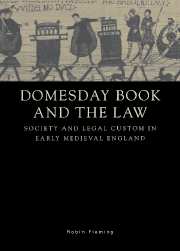Book contents
- Frontmatter
- Contents
- List of figures and tables
- Acknowledgments
- List of abbreviations
- Two brief notes on the texts and indexes
- Table of F numbers by county
- Frequency of legal information across counties and circuits
- Introduction
- Part I Domesday Book and the law
- Chapter 1 The inquest and the mechanics of justice
- Chapter 2 Living in the shadow of the law
- Chapter 3 Disputes and the Edwardian past
- Chapter 4 Disputes and the Norman present
- Part II The texts
- Part III Indexes
Chapter 2 - Living in the shadow of the law
Published online by Cambridge University Press: 14 January 2010
- Frontmatter
- Contents
- List of figures and tables
- Acknowledgments
- List of abbreviations
- Two brief notes on the texts and indexes
- Table of F numbers by county
- Frequency of legal information across counties and circuits
- Introduction
- Part I Domesday Book and the law
- Chapter 1 The inquest and the mechanics of justice
- Chapter 2 Living in the shadow of the law
- Chapter 3 Disputes and the Edwardian past
- Chapter 4 Disputes and the Norman present
- Part II The texts
- Part III Indexes
Summary
The business of local assemblies
Sworn men, as we have seen, sat at the heart of the Domesday inquest, and their words and their memories were the source of almost all the information in Domesday Book related to legal customs, legal activity, and disputes. The range of these men's knowledge is astonishing. Men living in boroughs could describe in detail regulations about weights and measures, about the proscriptions of certain types of behavior on holy days, about the fines for adultery, and about the punishments for theft, rape, arson, and homicide. Their familiarity with the penalties of sin and breach of peace was doubtless grounded in practical experience: they themselves lived in the shadow of legal custom, and many would have participated in accusing and judging individuals within their communities of social and legal transgressions. Their special expertise in the weaknesses of their neighbors and in the regulation of bad behavior shows how much of life was lived in full view of the community and indicates how often the private lives of burgesses were policed by deep-rooted social institutions manned by groups of curious neighbors.
The jurors in rural hundred courts and shire assemblies also knew a great deal about the lives of the families and individuals with whom they lived. During the 1086 inquest they were able to rehearse for the King's commissioners a whole universe of infractions — moral, familial, legal, and political. Members of hundred and shire assemblies, for example, knew who in their communities were thieves and who had carried out illegal feuds, and they could name those who held land without proper warranty.
- Type
- Chapter
- Information
- Domesday Book and the LawSociety and Legal Custom in Early Medieval England, pp. 36 - 52Publisher: Cambridge University PressPrint publication year: 1998



